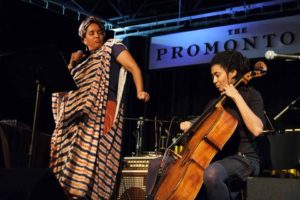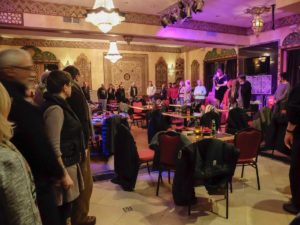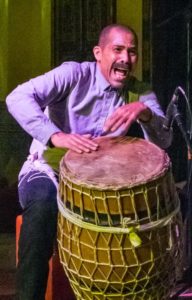There are good arguments for building venues just for jazz. But speaking of arts communities in general: Most are moveable feasts, fluid, transient, at best inviting to newcomers to the table.
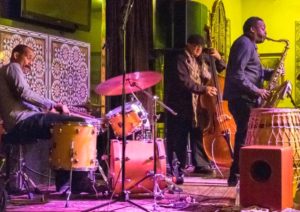
Kahil El’Zabar, Harrison Bankhead and David Murray at the Alhambra Palace, produced by HotHouse; photo by Marc PoKempner.
It’s demonstrable that when jazz players and listeners alight at all-purpose spaces such as Chicago’s Alhambra Palace, where Hot House produced the trio of saxophonist David Murray, bassist Harrison Bankhead and percussionist Kahil El’Zabar  on Monday, Dec. 12, or The Promontory in Hyde Park, where flutist Nicole Mitchell, cellist Tomeka Reid and multi-instrumentalists Maia led ensembles in Voices Heard: Expressions of Visionary Black Women on Saturday, Dec. 10 — we bring the empathetic attentions that lend the moment’s sounds memorable significance, wherever those moments take place.
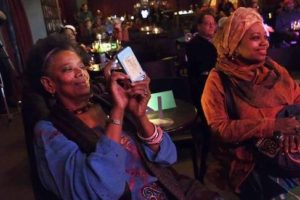
Janis Lane-Ewart, AACM curator and Minneapolis radio personality, and singer Dee Alexander at Promontory for Voices Heard (your blogger over Dee’s right shoulder). Photo by Lauren Deutsch.
Promontory, a 300-capacity room with copious table seating and bar space (plus in the summertime, an open-air veranda), features all sorts of events — local DJs and r&b groups, Latin dance nights, family holiday shows, homemade crafts fairs and acts typically ranging from local rappers, djs and r&b stars to off-beat touring choices such as Average White Band. Voices Heard (produced by a coalition of the Jazz Institute of Chicago, the David and Reba Logan Center for the Arts and the Association for the Advancement of Creative Musicians, funded by the Doris Duke Charitable Foundation), however, was a special two-day fest of talents too often and too long overlooked.
On Saturday, keyboardist and vocalist Amina Claudine Myers, one of the very first AACM members 50 years ago, improvised a warm, beguiling set with Mitchell. Vocalist Mankwe Ndosi and cellist  Tomeka Reid performed uproariously, using loops and other effects; the first ever AACM band of women, Samana, reunited with Maia emphatic on vibes; Mitchell on flute; Coco Elysses playing tympani and percussion; Shanta Nurullah on bass and mbira; singers Rita Warford, Africa Brown and Ugochi Nwaogwugwu, and baritone saxophonist/digeridooist Mwata Bowden as an honorary male member. The group spun out a long collaborative take on a theme by Maia (who also plays harp).
In both cases, the audiences comprised familiar coteries of friends and associates. This is nice for those of us who know each other, but suggests the challenge facing these musicians and presenters in attracting new listeners. In both cases the music, familiar or not, offered rewards.
At the Alhambra, a spacious facility with Arabian Nights decor in its main serving and meeting rooms, balcony and bars, El’Zabar was in particularly strong form on djembé,traps set and mbira, bassist Bankhead sensitive to each nuanced fluctuation of drum accents and volume, world-traveling Murray at home with his companions but also lifting their game with his own assertive energy.
At Promontory, the black women in creative music made their statement that music isn’t the performance province of only one sex, and of course it values elders as well as youngsters.
Every time that point is made it’s a victory for all and a step towards attracting people who may have previously felt shut out; now they’re specifically acknowledged and invited in. Both these venues were, at least for the length of the concerts, transformed from accommodating if somewhat impersonal halls into clubhouses welcoming devotees. Whenever spirited artists entertain their followers in flexible performance spaces, the events and attendees leave their impressions, ghostly vibes that subtly attune the sites for whoever comes next and later.
Thanks as always to my good friends Lauren Deutsch and Marc PoKempner for their lustrous images.

